formerly eScholarship Editions


|
|
|
|
Your search for
'Classics' in subject
found 117 book(s). | Modify Search | Displaying 41 - 60 of 117 book(s) | |
| 41. | 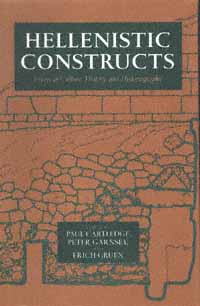 | Title: Hellenistic constructs: essays in culture, history, and historiography Author: Cartledge, Paul Published: University of California Press, 1997 Subjects: Classics | Classical History | History | Ancient History Publisher's Description: The Hellenistic period (approximately the last three centuries B.C.), with its cultural complexities and enduring legacies, retains a lasting fascination today. Reflecting the vigor and productivity of scholarship directed at this period in the past decade, this collection of original essays is a wide-ranging exploration of current discoveries and questions. The twelve essays emphasize the cultural interaction of Greek and non-Greek societies in the Hellenistic period, in contrast to more conventional focuses on politics, society, or economy. The result of original research by some of the leading scholars in Hellenistic history and culture, this volume is an exemplary illustration of the cultural richness of this period.Paul Cartledge's introduction contains an illuminating introductory overview of current trends in Hellenistic scholarship. The essays themselves range over broad questions of comparative historiography, literature, religion, and the roles of Athens, Rome, and the Jews within the context of the Hellenistic world. The volume is dedicated to Frank Walbank and includes an updated bibliography of his work which has been essential to our understanding of the Hellenistic period. [brief] Similar Items |
| 42. | 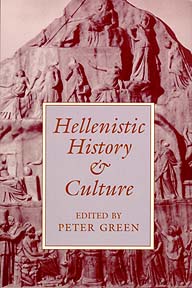 | Title: Hellenistic history and culture Author: Green, Peter 1924- Published: University of California Press, 1993 Subjects: Classics | Classical Philosophy | Ancient History | History Publisher's Description: In a 1988 conference, American and British scholars unexpectedly discovered that their ideas were converging in ways that formed a new picture of the variegated Hellenistic mosaic. That picture emerges in these essays and eloquently displays the breadth of modern interest in the Hellenistic Age.A distrust of all ideologies has altered old views of ancient political structures, and feminism has also changed earlier assessments. The current emphasis on multiculturalism has consciously deemphasized the Western, Greco-Roman tradition, and Nubians, Bactrians, and other subject peoples of the time are receiving attention in their own right, not just as recipients of Greco-Roman culture.History, like Herakleitos' river, never stands still. These essays share a collective sense of discovery and a sparking of new ideas - they are a welcome beginning to the reexploration of a fascinatingly complex age. [brief] Similar Items |
| 43. | 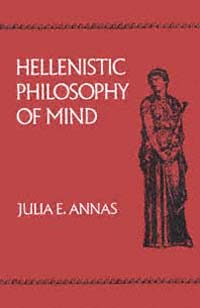 | Title: Hellenistic philosophy of mind Author: Annas, Julia Published: University of California Press, 1994 Subjects: Classics | Social and Political Thought | Intellectual History | Classical Philosophy | Philosophy | Rhetoric Publisher's Description: Hellenistic Philosophy of Mind is an elegant survey of Stoic and Epicurean ideas about the soul - an introduction to two ancient schools whose belief in the soul's physicality offer compelling parallels to modern approaches in the philosophy of mind. Annas incorporates recent thinking on Hellenistic philosophy of mind so lucidly and authoritatively that specialists and nonspecialists alike will find her book rewarding.In part, the Hellenistic epoch was a "scientific" period that broke with tradition in ways that have an affinity with the modern shift from the seventeenth and eighteenth centuries to the present day. Hellenistic philosophy of the soul, Annas argues, is in fact a philosophy of mind, especially in the treatment of such topics as perception, thought, and action. [brief] Similar Items |
| 44. | 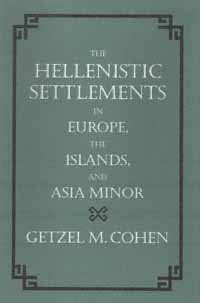 | Title: The Hellenistic settlements in Europe, the islands, and Asia Minor Author: Cohen, Getzel M Published: University of California Press, 1996 Subjects: Classics | History | Ancient History Publisher's Description: This compendium provides historical narratives, detailed references, citations, and commentaries on all the cities founded or refounded in Europe, The Islands, and Asia Minor during the Hellenistic period. Organized coherently in more than 180 entries, it is one of the most significant reference wor . . . [more] Similar Items |
| 45. | 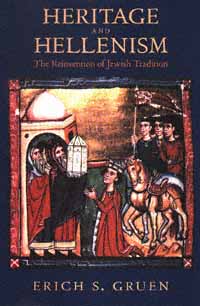 | Title: Heritage and hellenism: the reinvention of Jewish tradition Author: Gruen, Erich S Published: University of California Press, 1998 Subjects: Classics | Classical History | Classical Religions | Judaism | Ancient History | Jewish Studies Publisher's Description: The interaction of Jew and Greek in antiquity intrigues the imagination. Both civilizations boasted great traditions, their roots stretching back to legendary ancestors and divine sanction. In the wake of Alexander the Great's triumphant successes, Greeks and Macedonians came as conquerors and settled as ruling classes in the lands of the eastern Mediterranean. Hellenic culture, the culture of the ascendant classes in many of the cities of the Near East, held widespread attraction and appeal. Jews were certainly not immune. In this thoroughly researched, lucidly written work, Erich Gruen draws on a wide variety of literary and historical texts of the period to explore a central question: How did the Jews accommodate themselves to the larger cultural world of the Mediterranean while at the same time reasserting the character of their own heritage within it? Erich Gruen's work highlights Jewish creativity, ingenuity, and inventiveness, as the Jews engaged actively with the traditions of Hellas, adapting genres and transforming legends to articulate their own legacy in modes congenial to a Hellenistic setting. Drawing on a diverse array of texts composed in Greek by Jews over a broad period of time, Gruen explores works by Jewish historians, epic poets, tragic dramatists, writers of romance and novels, exegetes, philosophers, apocalyptic visionaries, and composers of fanciful fables - not to mention pseudonymous forgers and fabricators. In these works, Jewish writers reinvented their own past, offering us the best insights into Jewish self-perception in that era. [brief] Similar Items |
| 46. | 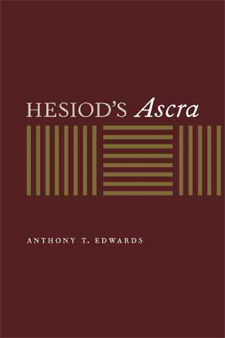 | Title: Hesiod's Ascra Author: Edwards, Anthony T Published: University of California Press, 2004 Subjects: Classics | Classical History | Classical Politics | Classical Literature and Language | Economics and Business Publisher's Description: In Works and Days, one of the two long poems that have come down to us from Hesiod, the poet writes of farming, morality, and what seems to be a very nasty quarrel with his brother Perses over their inheritance. In this book, Anthony T. Edwards extracts from the poem a picture of the social structure of Ascra, the hamlet in northern Greece where Hesiod lived, most likely during the seventh century b.c.e. Drawing on the evidence of trade, food storage, reciprocity, and the agricultural regime as Hesiod describes them in Works and Days, Edwards reveals Ascra as an autonomous village, outside the control of a polis, less stratified and integrated internally than what we observe even in Homer. In light of this reading, theconflict between Hesiod and Perses emerges as a dispute about the inviolability of the community's external boundary and the degree of interobligation among those within the village. Hesiod's Ascra directly counters the accepted view of Works and Days, which has Hesiod describing a peasant society subordinated to the economic and political control of an outside elite. Through his deft analysis, Edwards suggests a new understanding of both Works and Days and the social and economic organization of Hesiod's time and place. [brief] Similar Items |
| 47. | 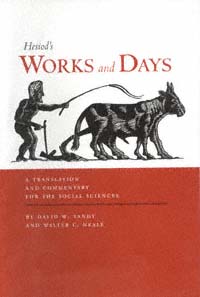 | Title: Hesiod's Works and days Author: Hesiod Published: University of California Press, 1997 Subjects: Economics and Business | Classics | Sociology | Ancient History Publisher's Description: This new, annotated translation of Hesiod's Works and Days is a collaboration between David W. Tandy, a classicist, and Walter Neale, an economist and economic historian. Hesiod was an ancient Greek poet whose Works and Days discusses agricultural practices and society in general. Classicists and ancient historians have turned to Works and Days for its insights on Greek mythology and religion. The poem also sheds light on economic history and ancient agriculture, and is a good resource for social scientists interested in these areas. This translation emphasizes the activities and problems of a practicing agriculturist as well as the larger, changing political and economic institutions of the early archaic period.The authors provide a clear, accurate translation along with notes aimed at a broad audience. The introductory essay discusses the changing economic, political and trading world of the eighth and seventh centuries B.C.E., while the notes present the range and possible meanings of important Greek terms and references in the poem and highlight areas of ambiguity in our understanding of Works and Days . [brief] Similar Items |
| 48. | 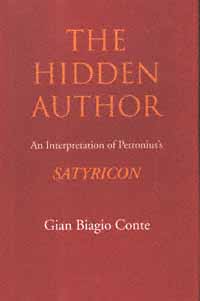 | Title: The hidden author: an interpretation of Petronius' Satyricon Author: Conte, Gian Biagio 1941- Published: University of California Press, 1997 Subjects: Classics | Classical Literature and Language | Literary Theory and Criticism Publisher's Description: The Satyricon of Petronius, a comic novel written in the first century A.D., is famous today primarily for its amazing banquet tale, "Trimalchio's Feast." But this episode is only one part of the larger picture of life during Nero's rule presented in the work. In this accessible discussion of Petronius's masterful use of parody, Gian Biagio Conte offers an interpretation of the Satyricon as a whole. He combines the scholarly precision of close reading with a significant, original theoretical model.At the heart of his interpretation, Conte reveals the technique of the "hidden author" that Petronius employs at the expense of his characters, in particular the teller of the story, Enclopius. By remaining hidden outside the narrative, Petronius invites the reader to smile at the folies de grandeur that occur in a culture of scholars and declaimers. Yet as Conte shows, behind the parody and inexhaustible humor of the Satyricon lies an unexpectedly serious lament. For those familiar with the Satyricon, as well as for new readers, Conte's book will be a reliable, enjoyable guide to the wonders the Satyricon contains. [brief] Similar Items |
| 49. | 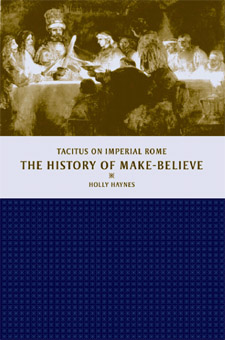 | Title: The history of make-believe: Tacitus on imperial Rome Author: Haynes, Holly Published: University of California Press, 2003 Subjects: Classics | Classical History | Classical Literature and Language | Political Theory | Ancient History Publisher's Description: A theoretically sophisticated and illuminating reading of Tacitus, especially the Histories , this work points to a new understanding of the logic of Roman rule during the early Empire. Tacitus, in Holly Haynes' analysis, does not write about the reality of imperial politics and culture but about the imaginary picture that imperial society makes of these concrete conditions of existence - the "making up and believing" that figure in both the subjective shaping of reality and the objective interpretation of it. Haynes traces Tacitus's development of this fingere/credere dynamic both backward and forward from the crucial year A.D. 69. Using recent theories of ideology, especially within the Marxist and psychoanalytic traditions, she exposes the psychic logic lurking behind the actions and inaction of the protagonists of the Histories . Her work demonstrates how Tacitus offers penetrating insights into the conditions of historical knowledge and into the psychic logic of power and its vicissitudes, from Augustus through the Flavians. By clarifying an explicit acknowledgment of the difficult relationship between res and verba, in the Histories, Haynes shows how Tacitus calls into question the possibility of objective knowing - how he may in fact be the first to allow readers to separate the objectively knowable from the objectively unknowable. Thus, Tacitus appears here as going further toward identifying the object of historical inquiry - and hence toward an "objective" rendering of history - than most historians before or since. [brief] Similar Items |
| 50. | 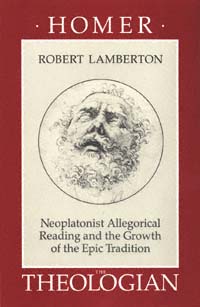 | Title: Homer the theologian: Neoplatonist allegorical reading and the growth of the epic tradition Author: Lamberton, Robert Published: University of California Press, 1989 Subjects: Classics | Classical Literature and Language | Literary Theory and Criticism Publisher's Description: Here is the first survey of the surviving evidence for the growth, development, and influence of the Neoplatonist allegorical reading of the Iliad and Odyssey. Professor Lamberton argues that this tradition of reading was to create new demands on subsequent epic and thereby alter permanently the nature of European epic. The Neoplatonist reading was to be decisive in the birth of allegorical epic in late antiquity and forms the background for the next major extension of the epic tradition found in Dante. [brief] Similar Items |
| 51. | 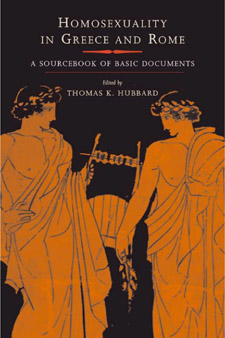 | Title: Homosexuality in Greece and Rome: a sourcebook of basic documents Author: Hubbard, Thomas K Published: University of California Press, 2003 Subjects: Gender Studies | Classics | GayLesbian and Bisexual Studies Publisher's Description: The most important primary texts on homosexuality in ancient Greece and Rome are translated into modern, explicit English and collected together for the first time in this comprehensive sourcebook. Covering an extensive period - from the earliest Greek texts in the late seventh century b.c.e. to Greco-Roman texts of the third and fourth centuries c.e. - the volume includes well-known writings by Plato, Sappho, Aeschines, Catullus, and Juvenal, as well as less well known but highly relevant and intriguing texts such as graffiti, comic fragments, magical papyri, medical treatises, and selected artistic evidence. These fluently translated texts, together with Thomas K. Hubbard's valuable introductions, clearly show that there was in fact no more consensus about homosexuality in ancient Greece and Rome than there is today. The material is organized by period and by genre, allowing readers to consider chronological developments in both Greece and Rome. Individual texts each are presented with a short introduction contextualizing them by date and, where necessary, discussing their place within a larger work. Chapter introductions discuss questions of genre and the ideological significance of the texts, while Hubbard's general introduction to the volume addresses issues such as sexual orientation in antiquity, moral judgments, class and ideology, and lesbianism. With its broad, unexpurgated, and thoroughly informed presentation, this unique anthology gives an essential perspective on homosexuality in classical antiquity. [brief] Similar Items |
| 52. | 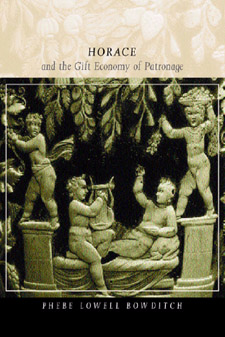 | Title: Horace and the gift economy of patronage Author: Bowditch, Phebe Lowell 1961- Published: University of California Press, 2001 Subjects: Classics | Classical Literature and Language | Poetry | Cultural Anthropology Publisher's Description: This innovative study explores selected odes and epistles by the late-first-century poet Horace in light of modern anthropological and literary theory. Phebe Lowell Bowditch looks in particular at how the relationship between Horace and his patron Maecenas is reflected in these poems' themes and rhetorical figures. Using anthropological studies on gift exchange, she uncovers an implicit economic dynamic in these poems and skillfully challenges standard views on literary patronage in this period. Horace and the Gift Economy of Patronage provides a striking new understanding of Horace's poems and the Roman system of patronage, and also demonstrates the relevance of New Historicist and Marxist critical paradigms for Roman studies. In addition to incorporating anthropological and sociological perspectives, Bowditch's theoretical approach makes use of concepts drawn from linguistics, deconstruction, and the work of Michel Foucault. She weaves together these ideas in an original approach to Horace's use of golden age imagery, his language concerning public gifts or munera, his metaphors of sacrifice, and the rhetoric of class and status found in these poems. Horace and the Gift Economy of Patronage represents an original approach to central issues and questions in the study of Latin literature, and sheds new light on our understanding of Roman society in general. [brief] Similar Items |
| 53. | 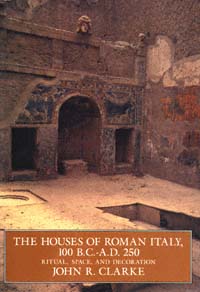 | Title: The houses of Roman Italy, 100 B.C.-A.D. 250: ritual, space, and decoration Author: Clarke, John R 1945- Published: University of California Press, 1992 Subjects: Classics | Art and Architecture | Architectural History | Art History Publisher's Description: In this richly illustrated book, art historian John R. Clarke helps us see the ancient Roman house "with Roman eyes." Clarke presents a range of houses, from tenements to villas, and shows us how enduring patterns of Roman wall decoration tellingly bear the cultural, religious, and social imprints of the people who lived with them.In case studies of seventeen excavated houses, Clarke guides us through four centuries of Roman wall painting, mosaic, and stucco decoration, from the period of the "Four Styles" (100 B.C. to A.D. 79) to the mid- third century. The First Style Samnite House shows its debt to public architecture in its clear integration of public and private spaces. The Villa of Oplontis asserts the extravagant social and cultural climate of the Second Style. Gemlike Third-Style rooms from the House of Lucretius Fronto reflect the refinement and elegance of Augustan tastes. The Vettii brothers' social climbing helps explain the overburdened Fourth-Style decoration of their famous house. And evidence of remodelling leads Clarke to conclude that the House of Jupiter and Ganymede became a gay hotel in the second century.In his emphasis on social and spiritual dimensions, Clarke offers a contribution to Roman art and architectural history that is both original and accessible to the general reader. The book's superb photographs not only support the author's findings but help to preserve an ancient legacy that is fast succumbing to modern deterioration resulting from pollution and vandalism. [brief] Similar Items |
| 54. | 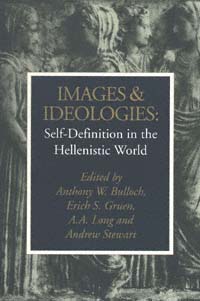 | Title: Images and ideologies: self-definition in the Hellenistic world Author: Bulloch, A. W Published: University of California Press, 1994 Subjects: Classics | Philosophy | Classical Philosophy | Ancient History | Art History Publisher's Description: This volume captures the individuality, the national and personal identity, the cultural exchange, and the self-consciousness that have long been sensed as peculiarly potent in the Hellenistic world. The fields of history, literature, art, philosophy, and religion are each presented using the format of two essays followed by a response.Conveying the direction and focus of Hellenistic learning, eighteen leading scholars discuss issues of liberty versus domination, appropriation versus accommodation, the increasing diversity of citizen roles and the dress and gesture appropriate to them, and the accompanying religious and philosophical ferment. The result is an arresting view of the incredible and unprecedented diversity of the Hellenistic world. [brief] Similar Items |
| 55. | 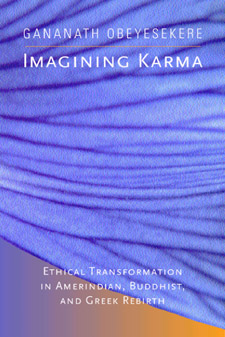 | Title: Imagining karma: ethical transformation in Amerindian, Buddhist, and Greek rebirth Author: Obeyesekere, Gananath Published: University of California Press, 2002 Subjects: Religion | Anthropology | Buddhism | Classics | Indigenous Religions | Asian Studies Publisher's Description: With Imagining Karma, Gananath Obeyesekere embarks on the very first comparison of rebirth concepts across a wide range of cultures. Exploring in rich detail the beliefs of small-scale societies of West Africa, Melanesia, traditional Siberia, Canada, and the northwest coast of North America, Obeyesekere compares their ideas with those of the ancient and modern Indic civilizations and with the Greek rebirth theories of Pythagoras, Empedocles, Pindar, and Plato. His groundbreaking and authoritative discussion decenters the popular notion that India was the origin and locus of ideas of rebirth. As Obeyesekere compares responses to the most fundamental questions of human existence, he challenges readers to reexamine accepted ideas about death, cosmology, morality, and eschatology. Obeyesekere's comprehensive inquiry shows that diverse societies have come through independent invention or borrowing to believe in reincarnation as an integral part of their larger cosmological systems. The author brings together into a coherent methodological framework the thought of such diverse thinkers as Weber, Wittgenstein, and Nietzsche. In a contemporary intellectual context that celebrates difference and cultural relativism, this book makes a case for disciplined comparison, a humane view of human nature, and a theoretical understanding of "family resemblances" and differences across great cultural divides. [brief] Similar Items |
| 56. | 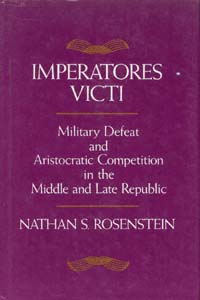 | Title: Imperatores victi: military defeat and aristocratic competition in the middle and late republic Author: Rosenstein, Nathan Stewart Published: University of California Press, 1990 Subjects: Classics | Classical History | Military History | Ancient History Publisher's Description: Given the intense competition among aristocrats seeking public office in the middle and late Roman Republic, one would expect that their persistent struggles for honor, glory, and power could have seriously undermined the state or damaged the cohesiveness of the ruling class. Rome in fact depended on aristocratic competition, since no professional bureaucracy directed public affairs and no salary was attached to any public office. But as Rosenstein adeptly shows, competition appears to have been surprisingly limited, in ways that curtailed the possible destructive effects of all-out contests between individuals. Imperatores Victi examines one particularly striking case of such checks on competition. Military success at all times represented an abundant source of prestige and political strength at Rome. Generals who led armies to victory enjoyed a better-than-average chance of securing higher office upon their return from the field. Yet this study demonstrates that defeated generals were not barred from public office and in fact went on to win the Republic's most highly coveted and hotly contested offices in numbers virtually identical with those of their undefeated peers.Rosenstein explores how this unexpected limit to competition functions, reviewing beliefs about the religious origins of defeat, assumptions about common soldiers' duties in battle, and definitions of honorable behavior of an aristocrat during a crisis. These perspectives were instrumental in shifting the onus of failure away from a general's person and in offering positive strategies a general might use to win glory and respect even in defeat and to silence potential critics among a failed general's peers. Such limits to competition had an impact on the larger problems of stability and coherence in the Republic and its political elite; these larger problems are discussed in the concluding chapter. [brief] Similar Items |
| 57. | 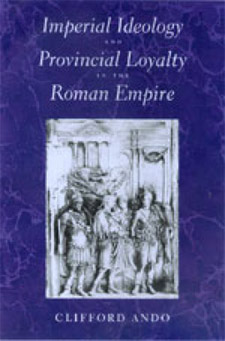 | Title: Imperial ideology and provincial loyalty in the Roman Empire Author: Ando, Clifford 1969- Published: University of California Press, 2000 Subjects: Classics | Classical History | Ancient History | Social Theory Publisher's Description: The Roman empire remains unique. Although Rome claimed to rule the world, it did not. Rather, its uniqueness stems from the culture it created and the loyalty it inspired across an area that stretched from the Tyne to the Euphrates. Moreover, the empire created this culture with a bureaucracy smaller than that of a typical late-twentieth-century research university. In approaching this problem, Clifford Ando does not ask the ever-fashionable question, Why did the Roman empire fall? Rather, he asks, Why did the empire last so long? Imperial Ideology and Provincial Loyalty in the Roman Empire argues that the longevity of the empire rested not on Roman military power but on a gradually realized consensus that Roman rule was justified. This consensus was itself the product of a complex conversation between the central government and its far-flung peripheries. Ando investigates the mechanisms that sustained this conversation, explores its contribution to the legitimation of Roman power, and reveals as its product the provincial absorption of the forms and content of Roman political and legal discourse. Throughout, his sophisticated and subtle reading is informed by current thinking on social formation by theorists such as Max Weber, Jürgen Habermas, and Pierre Bourdieu. [brief] Similar Items |
| 58. | 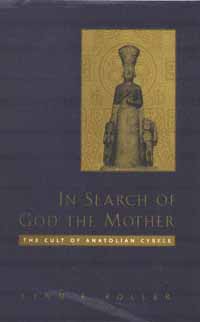 | Title: In search of god the mother: the cult of Anatolian Cybele Author: Roller, Lynn E Published: University of California Press, 1999 Subjects: Classics | Archaeology | Ancient History | Gender Studies | Women's Studies | Religion | Comparative Religions Publisher's Description: This book examines one of the most intriguing figures in the religious life of the ancient Mediterranean world, the Phrygian Mother Goddess, known to the Greeks and Romans as Cybele or Magna Mater, the Great Mother. Her cult was particularly prominent in central Anatolia (modern Turkey), and spread from there through the Greek and Roman world. She was an enormously popular figure, attracting devotion from common people and potentates alike. This book is the first comprehensive assembly and discussion of the entire extant evidence concerning the worship of the Phrygian Mother Goddess, from her earliest appearance in the prehistoric record to the early centuries of the Roman Empire.Lynn E. Roller presents and analyzes literary, historiographic, and archaeological data with equal acuity and flair. While previous studies have tended to emphasize the more outrageous aspects of the Mother Goddess's cult, such as her orgiastic rituals and the eunuch priests who attended her, this book places a special focus on Cybele's position in Anatolia and the ways in which the identity of the goddess changed as her cult was transmitted to Greece and Rome. Roller gives a detailed account of the growth, spread, and evolution of her cult, her ceremonies, and her meaning for her adherents.This book will introduce students of Classical antiquity to many aspects of the Great Mother which have been previously unexamined, and will interest anyone who has ever been piqued by curiosity about the Mother Goddess of the ancient Western world. [brief] Similar Items |
| 59. | 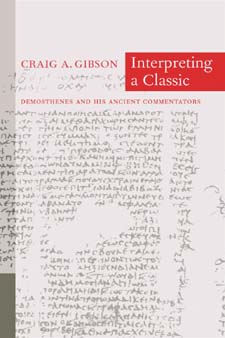 | Title: Interpreting a classic: Demosthenes and his ancient commentators Author: Gibson, Craig A 1968- Published: University of California Press, 2002 Subjects: Classics | Classical Literature and Language | Rhetoric | Classical History Publisher's Description: Demosthenes (384-322 b.c.) was an Athenian statesman and a widely read author whose life, times, and rhetorical abilities captivated the minds of generations. Sifting through the rubble of a mostly lost tradition of ancient scholarship, Craig A. Gibson tells the story of how one group of ancient scholars helped their readers understand this man's writings. This book collects for the first time, translates, and offers explanatory notes on all the substantial fragments of ancient philological and historical commentaries on Demosthenes. Using these texts to illuminate an important aspect of Graeco-Roman antiquity that has hitherto been difficult to glimpse, Gibson gives a detailed portrait of a scholarly industry that touched generations of ancient readers from the first century b.c. to the fifth century and beyond. In this lucidly organized work, Gibson surveys the physical form of the commentaries, traces the history of how they were passed down, and explains their sources, interests, and readership. He also includes a complete collection of Greek texts, English translations, and detailed notes on the commentaries. [brief] Similar Items |
| 60. | 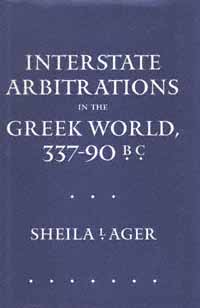 | Title: Interstate arbitrations in the Greek world, 337-90 B.C. Author: Ager, Sheila L 1956- Published: University of California Press, 1997 Subjects: Classics | Classical History | Ancient History Publisher's Description: A great deal of information has come to light over the past several decades about the role of arbitration between the Greek states. Arbitration and mediation were, in fact, central institutions in Hellenistic public life. In this comprehensive study, Sheila Ager brings together the scattered body of literary and epigraphical sources on arbitration, together with up-to-date bibliographic references, and commentary.The sources collected here range widely; Ager presents an exhaustive record of documents ranging from the settlement of a minor territorial squabble between two tiny city-states to the resolution of major conflicts separating the great powers of the day. In addition, Ager's introduction sets the documents in historical context and outlines distinctions among categories of arbitration. The work also includes indices to literary passages, inscriptions, persons, places, subjects, and Greek and Latin terms in the documents. This collection of many previously inaccessible texts will become a primary resource for any scholar or student working in the field of Hellenistic history. [brief] Similar Items |